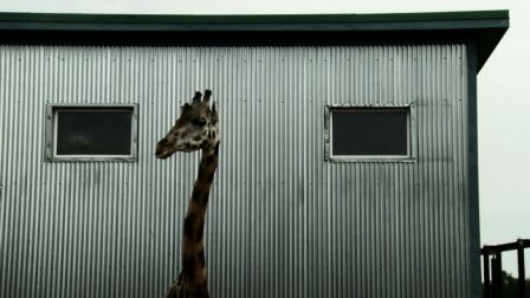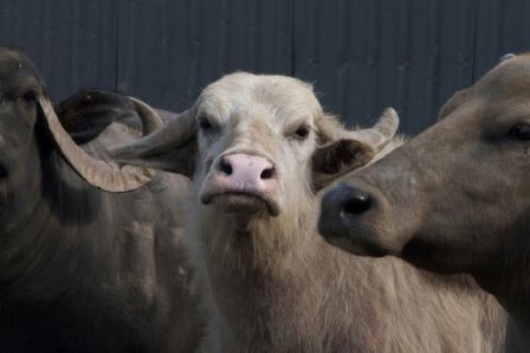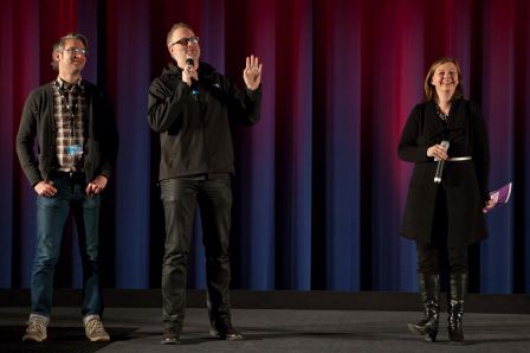Berlinale: Observations in and on “Bestiaire”
Published on
Watching monkeys at a zoo, one can never be quite sure who is observing whom. During one of my few visits to Berlin’s Zoologischer Garten, a smart little caged creature held its hands to its face as if holding an imaginary camera. It looked at me through the thus formed frame, and I was almost sure I glimpsed an ironic smile.
Even if it was but a clever imitation of the gesture the observant creature is surely often faced with, and even if I project too much of an anthropomorphic interpretation, it still made me realize how arbitrary that role division was—the fact that I am on this side of the cage, having paid to look inward.
 Filmstill, Internationale Filmfestspiele Berlin
Filmstill, Internationale Filmfestspiele Berlin
Observation is both the main topic as well as the main formal characteristic of Bestiaire directed by Denis Côté. We observe the concentrated faces of young people during a drawing session—their eyes move back and forth between the animal on the paper and the object, which is disclosed as a stuffed animal at the moment of the last shot; a safari park during a snowy winter with animals walking outside, while others from warmer climates are locked indoors; taxidermists going about their work, creating frozen counterparts of what we just saw alive; and, finally, the summer crowds of visitors apparently so busy taking photos of the animals that they actually fail to see them.
The observational character of the film is further enhanced by its form. The camerawork is carefully pre-composed and static from the very first scene. Even the focus plane remains at the same depth while subjects move in and out of it. As an introduction to the film screening, Côté recalled a remark made by a viewer at the Sundance Film Festival: “This film is about an audience watching a film.”
Indeed, Bestiare’s technique reminds me of another, unfortunately quite unknown film entitled Five Dedicated to Ozu (2003) by the Iranian director Abbas Kiarostami. Therein too, during the long, static scenes in which almost nothing happens, a reflective process is initiated in the viewer, who thus becomes aware of and preoccupied with the process of watching itself. In Bestiaire, this effect is even stronger. The animals we observe do not hide their awareness of the camera’s presence and often look directly at it. Sometimes, it becomes so unsettling to sit in the dark while a melancholic bull is staring at you from the screen for minutes, that the film inevitably tries to relieve the tension by cutting to a comical intermezzo—an ostrich, with its long neck and big eyes, which expresses nothing, really nothing else, but curiosity.
 Filmstill, Internationale Filmfestspiele Berlin
Filmstill, Internationale Filmfestspiele Berlin
This film obviously does not pretend to be ordinary entertainment. It is also full of ethical connotations. It is the pity we feel for the animals that have to spend long, cold winters in bleak cramped spaces made of concrete and metal; anxious, nervous or just looking desperate. It is the taxidermic techniques of separating skin from flesh and flesh from bone that provoke disgust, a feeling closely connected with our sense of morality. The title itself refers us to the illustrated compendiums of animals that have placed such creatures in a religiously moralizing textual context; for example, the presentation of pelicans that pull out their chest feathers in order to feed their young ones on their own blood, thus saving them from starvation, as an allegory to Jesus’ sacrifice in order to save the sinners from eternal death.
 February 12 2012, Sylvain Corbeil, Denis Côté, Internationale Filmfestspiele Berlin
February 12 2012, Sylvain Corbeil, Denis Côté, Internationale Filmfestspiele Berlin
Having said that, the director’s vehement denial that this beautiful and unusual film’s ethical component is something arbitrary, and only something the viewer may or may not “project into it”, was somewhat irritating. Of course, no artistic work can be reduced to its moral message, but when the latter is as powerful and as well-aligned with the aesthetic form as in Bestiaire, such a dismissal seems suspect. The silent producer, who stood by the director’s side during the Q&A session that followed the screening, could not introduce any more clarity regarding the question: Why deny?
(Bestiare’s last screening is on Thursday, February 16 at 22:45 in Kino Arsenal.)




